Make it yours
Every experience is customised to be just right for you.
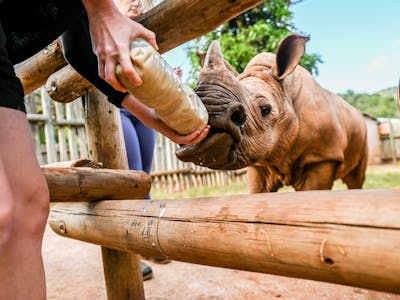
Surrounded by 7,500 acres (3,000ha) of wildlife reserve, Care For Wild Africa is the largest - and one of the most successful - rhino sanctuaries in the world.
From bottle-feeding orphaned rhinos in the sanctuary to monitoring older rhinos after they’re released into the wild, you’ll live inside this renowned centre and work hands-on to help save the rhino.
Spending time up close with these amazing creatures, you’ll get unique insight into their behaviour and individual personalities. During your stay, you'll also gain a holistic understanding of how to care for rhino and other species with guidance from leading conservationists.
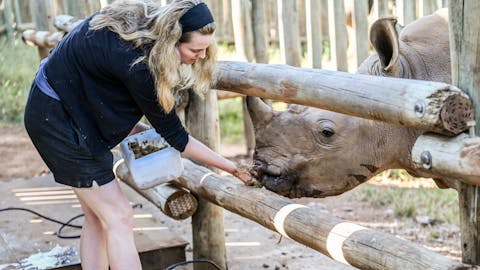
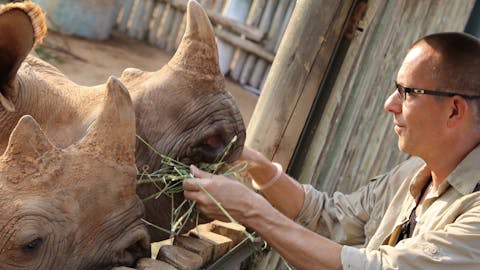
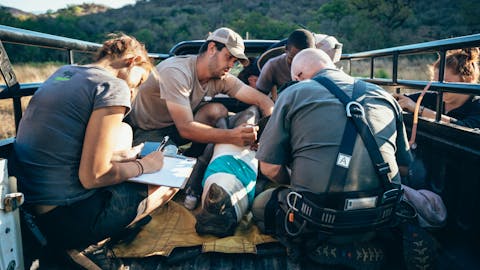
Roll up your sleeves and get stuck into the everyday work of a genuine wildlife rehabilitation centre. Feeding, cleaning, mucking out - this is real, practical work on the frontline of rhino conservation.
Care For Wild Africa Rhino Sanctuary’s project leader Petronel Nieuwoudt is one of the world’s leading experts in the rehabilitation of rhino, with an excellent track record of releasing animals successfully into the wild.
Care For Wild Africa Rhino Sanctuary has successfully released many of its orphans back into the surrounding reserve, and these survivors are regularly monitored to ensure they are safe and thriving.
Care For Wild Africa Rhino Sanctuary is accredited by the National Parks Board of South Africa.
Care For Wild Africa aims to establish a viable breeding population of at least one hundred rhino on their reserve. By joining this project, you’ll provide vital support and funding towards this ambition and have a meaningful impact on rhino conservation.
From training anti-poaching teams to carrying out cutting-edge research into rhino nutrition and veterinary science, Care For Wild works in partnership with global rhino experts to ensure a future for this amazing species. Your visit will help fund and support this vital work.
Just 3.5 hours from Johannesburg and only half an hour from the provincial capital, Mbombela (Nelspruit), Care For Wild Africa Rhino Sanctuary has easy access to all the facilities of a major city. However, it’s also surrounded by 7,500 acres (3,000ha) of wilderness, giving you the feeling of true isolation.
Care For Wild Africa is a very social project with organised activities including music evenings, nights around the campfire, and wild swimming excursions to a nearby river. This makes it a great place to meet like-minded people from around the world.
You’ll support the project team with a variety of care and monitoring activities. Depending on the centre’s priorities and the animals’ welfare needs at the time, this will include a range of the following responsibilities.
As part of a dedicated team, you’ll help care for and rehabilitate rhinos so that they can begin their long journey towards release back into the wild.
You will get to assist:
You could also observe or assist:
Surrounding the rehabilitation centre is a wildlife reserve. Once old enough, the rhinos can be released into this reserve where their safety and wellbeing continue to be monitored.
You will get to assist:
You could also assist:
The project staff will give you detailed lectures on how to hand-rear rhinos so you’re ready to help with this important work. If there are baby rhinos at the centre during your stay, you will get to observe or assist:
You could also get to assist:
Care For Wild Africa works with surrounding communities to provide jobs for local people and develop food gardens, farming initiatives, and support to local children. Your contributions will have a significant impact on the wellbeing of these communities. You could assist:
You’ll learn about the care and rehabilitation of rhinos, as well as their behaviour, biology, ecology, and conservation issues. Depending on the animals being cared for and the centre’s work at the time, this will include a range of the following topics.
This project contributes to a variety of the UN’s Sustainable Development Goals. As part of the team, so will you.
The content of this publication has not been approved by the United Nations and does not reflect the views of the United Nations or its officials or Member States.

Care For Wild Africa has created small-scale farms and vegetable gardens which provide food, employment and income for the communities around the centre. The methods of farming employed by the community farms are low impact, organic, and carried out by hand.

Through the Good Works Foundation, a local NGO, Care For Wild Africa welcomes local youth groups for weeks at a time to educate local South Africans about rhino conservation.
All learners acquire knowledge on how human actions can affect wildlife and how they can minimise this effect - and have access to the same standard of education regardless of sex and background.

Care For Wild Africa provides equal employment opportunities and women hold key leadership and decision-making roles, including the project founder. The centre also offers equal volunteering opportunities for women and men from outside the local community.

Care For Wild Africa has implemented a modern solar energy system to power the centre efficiently and sustainably.

Care For Wild Africa routinely employs young people between 15 and 24 and provides equal employment opportunities for local men and women. Volunteers provide both economic and physical support, facilitating important rhino conservation work and sustainable farming initiatives.

Through the financial support generated by self-funded international volunteers, Care For Wild Africa has been able to implement a solar energy system that powers the project - thereby developing resilient and sustainable energy infrastructure in Africa.

Care For Wild Africa requires participants to pay for volunteering, which supports their conservation and community activities. They offer a reduced rate for South African volunteers to promote inclusion among local people.

Care For Wild Africa builds sustainable and resilient buildings using materials that are locally sourced from within South Africa. The project also protects natural heritage through the conservation of iconic African species, the black and white rhino.

Care For Wild Africa promotes responsible tourism in a variety of ways: through the creation of local jobs; via community work that sustains local cultures; by educating international and local visitors how to live in harmony with nature; and in its vital conservation work.

Care For Wild Africa takes urgent action to halt biodiversity loss and prevent the extinction of threatened species. By rescuing and rehabilitating black and white rhino, the project prevents the degradation of ecosystems in which these species play a crucial ecological role. The reserve surrounding the centre is a protected habitat where flora and fauna are allowed to flourish.
Care For Wild Africa also takes urgent action to prevent poaching in the Kruger National Park, the epicentre of Africa’s poaching crisis. By employing a highly skilled anti-poaching unit and training officers to protect other wildlife reserves against poachers, the project is a leading force in Africa’s anti-poaching movement.

Care For Wild Africa employs an expert team of anti-poaching officers, who patrol the reserve to combat and deter poachers and reduce the unethical practices associated with their activities.

Through Care For Wild Africa’s partnership with us, they draw in financial resources that are used to fund conservation and provide support to their community partners in South Africa.
Related experiences
Explore programs similar to this one.
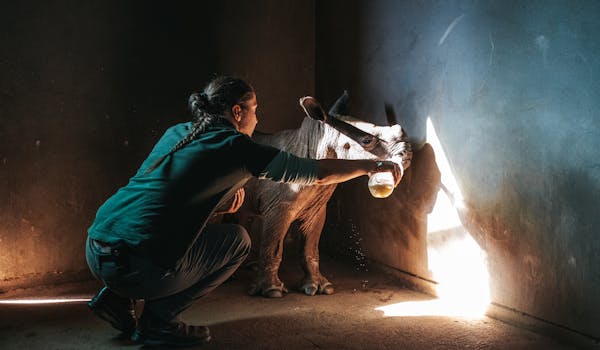
Experience daily life working with orphaned baby rhinos, supervised by a dedicated team of experts
View details for Golola Rhino Orphanage And Rehabilitation Centre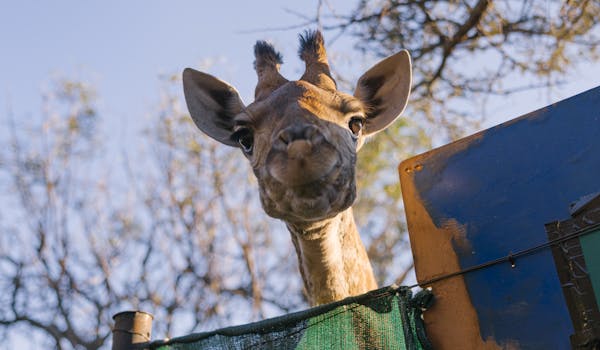
Help care for injured and endangered wildlife in a dedicated rehabilitation centre
View details for Moholoholo Wildlife Rehabilitation Centre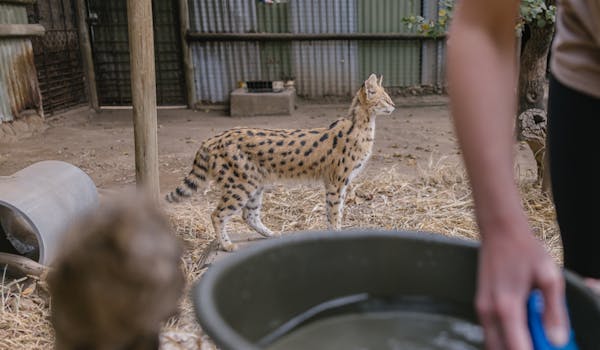
Make a meaningful difference at two of South Africa's most respected wildlife rehabilitation centres
View details for The Immersive Wildlife Rehabilitation Experience